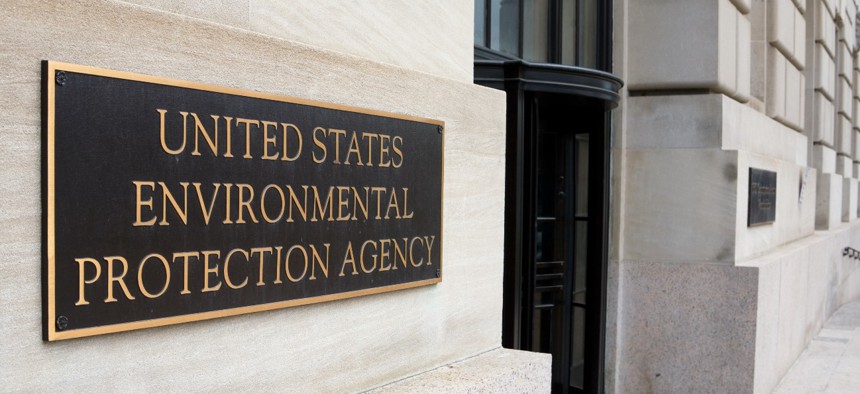
In a statement EPA officials stressed the agency's commitment to transparency. Skyhobo / Getty Images
The EPA is Getting Rid of Its Online Archive and Groups Are Unhappy
The agency reiterated its commitment to transparency amid the pushback.
The Environmental Protection Agency plans to sunset its online archive next month and activist groups are not happy about it.
Content from the archive will be moved elsewhere when the archive is retired in July. The agency argues it is not compromising transparency by doing so, but a range of groups have voiced their concerns.
“It is alarming …that the EPA plans to remove its online archive as this archive constitutes an important, albeit incomplete, public record of the agency’s positions and activities over the last 20+ years,” says an open letter published on Monday from 20 environmental and archivist groups. “There are documents discoverable through the archive that are not available anywhere else, such as records of the authorization of various chemicals, monitoring data from natural disasters, and resources regarding past or proposed policies.”
Gretchen Gehrke, co-founder and program leader at the Environmental Data and Governance Initiative, one of the organizations behind the letter, said EPA is “unique” among the federal agencies in offering such an archive. The group was first established in November 2016 to document and study the changes the Trump administration would make to environmental policies, websites and more.
Other organizations that joined the letter include the Government Accountability Project, Sierra Club and Internet Archive, a nonprofit that is archiving the Internet itself.
Professional historians’ organizations sent another letter opposing the move.
“This EPA archive has already proven immensely useful to environmental historians,” wrote Sarah Elkind, president of the American Society for Environmental History, in the letter that six other groups signed onto. “Not only are citations to it regularly featured in traditional scholarly venues, it has greatly facilitated projects such as ‘A People’s EPA,’ a website and Twitter feed through which historians help explain the work of the EPA to a broader public.”
The letter acknowledged that maintenance of the archive is voluntary and requires some costs, “but those need to be factored against the better and broader understanding it has nourished of the vital work done by this federal agency, whose own future hinges on greater public awareness of and support for what it does.”
The EPA provided a lengthy statement to Government Executive stressing the agency’s commitment to transparency, which EPA Administrator Michael Regan championed in a memo to employees in April 2021.
“It’s important to note that the EPA archive exists on an old and outdated technology that is no longer cost effective to maintain or update, so the agency is taking great strides to be financially responsible in this endeavor,” said the statement. “The EPA archive was never established to be a repository of information that would remain in public view forever; therefore, a plan was established to inventory, analyze, and make decisions about this content.”
Some information from the archive will go to the EPA’s main website (such as the new releases) and anything that is shared with the National Archives and Records Administration or recorded as a record will be accessible through the Freedom of Information Act. Content “that is obsolete or not required by law or regulation will be deleted or officially recorded as records,” in accordance with NARA’s policy.
“Hundreds of content owners across the EPA will continue to work closely to make reasonable and sound decisions about content in the archive website,” the statement continued. “As an agency, we are all committed to open and transparent communication about this project, and we are dedicated to providing the public with relevant, meaningful, and timely information on all our digital services.”







